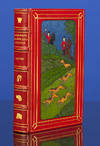![Beikoku Ni Sumu Nihonjin No Sakebi [in Japanese characters, translated as The Protest of Japanese Americans: My Forty Year Stay in America]](https://d3525k1ryd2155.cloudfront.net/h/106/202/1445202106.0.m.0.jpg)
Beikoku Ni Sumu Nihonjin No Sakebi [in Japanese characters, translated as The Protest of Japanese Americans: My Forty Year Stay in America]
by Fujii, Sei
- Used
- Condition
- About very good.
- Seller
-
Dobbs Ferry, New York, United States
Payment Methods Accepted
About This Item
Los Angeles: Kashu Mainichi Shinbunsha, 1940. About very good.. [2],2,16,420,[1]pp. Original pictorial wrappers. Minor soiling and light edge wear to wrappers; spine ends a bit chipped; front hinge starting from both ends. Text browned, but not brittle, with scattered foxing and dust soiling. A rare collection of writings by an important Japanese-American activist, journalist, and editor. Sei Fujii (1882-1954) was the founding editor of the Kashu Mainichi (Los Angeles Japanese-California Daily News) in L.A. Fujii emigrated to California from Japan in 1903 and obtained a law degree from the University of Southern California. Sadly, Fujii was unable to practice law in the United States because he was not an American citizen, and he was unable to earn American citizenship because he was Japanese - a cycle of injustice that took a few more decades to correct. After graduation, Fujii went back and forth to Japan, finally settling for good in Los Angeles shortly before 1930, where he founded the Kashu Mainichi in 1931. During World War II, Fujii was interned as an enemy alien in New Mexico, where he was not able to secure his release until 1946. After the war, he successfully challenged California's 1913 alien land law, which prohibited Japanese immigrants from owning real estate. In Fujii v. California, he convinced the California Supreme Court to overturn decades of legal precedents, ending forty years of prohibitions on property ownership and other racially- and ethnically-motivated restrictions. Fujii's activism and dogged determination for justice culminated in 1954, when he was finally able to call himself an American citizen; he was also finally granted his law license posthumously in 2017, sixty-three years after his death.
"A collection of newspaper editorials and columns published by the Kashu Mainichi of Los Angeles. Many articles deal with the patriotic activities of Japanese immigrants after the outbreak of the Sino-Japanese War in 1937" - Encyclopedia of Japanese Descendants in the Americas. The present work was reprinted in 2013. OCLC records just seven institutional copies of this original 1940 edition - six in the United States and one in Japan.
"A collection of newspaper editorials and columns published by the Kashu Mainichi of Los Angeles. Many articles deal with the patriotic activities of Japanese immigrants after the outbreak of the Sino-Japanese War in 1937" - Encyclopedia of Japanese Descendants in the Americas. The present work was reprinted in 2013. OCLC records just seven institutional copies of this original 1940 edition - six in the United States and one in Japan.
Reviews
(Log in or Create an Account first!)
Details
- Bookseller
- McBride Rare Books
(US)
- Bookseller's Inventory #
- 2532
- Title
- Beikoku Ni Sumu Nihonjin No Sakebi [in Japanese characters, translated as The Protest of Japanese Americans: My Forty Year Stay in America]
- Author
- Fujii, Sei
- Book Condition
- Used - About very good.
- Quantity Available
- 1
- Publisher
- Kashu Mainichi Shinbunsha
- Place of Publication
- Los Angeles
- Date Published
- 1940
Terms of Sale
McBride Rare Books
All items are guaranteed as described. Any purchase may be returned for a full refund within 10 working days as long as it is returned in the same condition and is packed and shipped correctly. All items subject to prior sale.
About the Seller
McBride Rare Books
Biblio member since 2018
Dobbs Ferry, New York
About McBride Rare Books
We specialize in American history, focusing on unique and eclectic materials such as archives, broadsides, vernacular photography, and interesting or unusual imprints. Particular fields of interest include Western Americana and Latin America.
Glossary
Some terminology that may be used in this description includes:
- Hinge
- The portion of the book closest to the spine that allows the book to be opened and closed.
- New
- A new book is a book previously not circulated to a buyer. Although a new book is typically free of any faults or defects, "new"...
- Wrappers
- The paper covering on the outside of a paperback. Also see the entry for pictorial wraps, color illustrated coverings for...
- Spine
- The outer portion of a book which covers the actual binding. The spine usually faces outward when a book is placed on a shelf....





